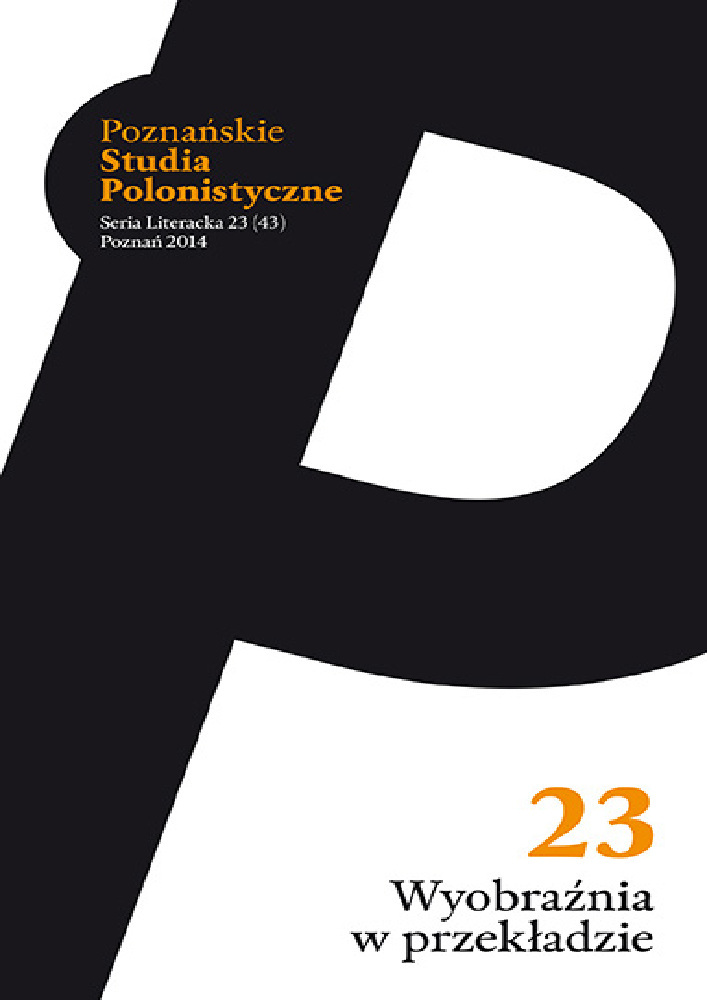Abstrakt
On the example of Mann’s Der Erwählte (1951) and its Polish version Wybraniec (1960) by Anna Linke, the article demonstrates how the creator’s imagination (the creators are the author and the translator) is related to translation and cultural memory, the basic notions of recent German culture studies. Mann’s novel can be described as a parodistic translation of a medieval epic, a text belonging to German cultural memory, into 20th century discourse and language. The article shows Mann’s translation strategies, whose aim is actualisation of the stocks of cultural memory of German readers: an experimental style imitating Medieval language, specific structure of narration time, represented world, and the narrator’s character, the montage and ecphrasis, which are all techniques calling for creative imagination. The article then demonstrates how Mann’s techniques were rendered in the translation. The analysis shows that Linke’s text, by referring to cultural memory of Polish readers, activates the content which is absent in cultural memory of German readers: this is because the translation employs fabulous and archaic elements derived from Polish historical novel, instead of stylistic and genre-specific techniques of German medieval epics. References to the visual archive of common European cultural memory (medieval iconography and architecture) clearly facilitate the translation, and the translator’s own imagination allows for credible rendition of names of medieval realities. The most important task was the rendition of the medieval dialect, which was fully Mann’s imaginary creation.Bibliografia
Assmann A., Der lange Schatten der Vergangenheit. Erinnerungskultur und eschichtspolitik, München 2006.
Assmann A., Gedächtnis als Leitbegriff der Kulturwissenschaften, w: Kulturwissenschaften: Forschung – Praxis – Positionen, red. L. Musner, G. Wunberg, Wien 2002.
Assmann J., Kollektives Gedächtnis und kulturelle Identität, w: Kultur und Gedächtnis, red. J. Assmann, T. Hölscher, Frankfurt am Main 1988.
Assmann J., Pamięć kulturowa: pismo, zapamiętywanie i polityczna tożsamość w cywilizacjach starożytnych, tłum. A. Kryczyńska-Pham, wstęp, red. nauk. R. Traba, Warszawa 2008.
Auerbach E., Adam i Ewa, w: idem, Mimesis. Rzeczywistość przedstawiona w literaturze Zachodu, tłum., wstęp Z. Żabicki, t. 1, Warszawa 1968.
Bachmann-Medick D., „Cultural turns”. Neuorientierungen in den Kulturwissenschaften, Reinbek bei Hamburg 2009.
Bachmann-Medick D., Einleitung: Übersetzung als Repräsentation fremder Kulturen, „Göttinger Beiträge zur internationalen Übersetzungsforschung”, t. 12: Übersetzung als Repräsentation fremder Kulturen, red. D. Bachmann-Medick, Berlin 1997.
Beer U., Das Gregorius-Motiv. Hartmanns von Aue „Gregorius” und seine Rezeption bei Thomas Mann, Meldorf 2002.
Bering D., Kulturelles Gedächtnis [hasło], w: Gedächtnis und Erinnerung. Ein interdisziplinäres Lexikon, red. N. Pethes, J. R uchatz, Reinbek bei Hamburg 2001.
Chrząstowska B., Wysłouch S., Poetyka stosowana, Warszawa 2000.
Erll A., Kollektives Gedächtnis und Erinnerungskulturen, Stuttgart – Weimar 2011.
Eschenbach W. von, Parzival. Mittelhochdeutsch/Neuhochdeutsch, tłum., posłowie W. Spiewok, Stuttgart 1989.
F ix U., Der Erwählte, w: Das erzählerische Werk Thomas Manns. Entstehungsgeschichte – Quellen – Wirkung, Berlin – Weimar 1976.
Goethe J.W., Noten und Abhandlungen zu besserem Verständnis des „West-Östlichen Divans”, w: idem, West-Östlicher Divan, Frankfurt am Main 1988.
Huizinga J., Jesień średniowiecza, tłum. T. Brzostowski, Warszawa 1992.
Kuhn H., Der gute Sünder – der Erwählte?, w: Hartmann von Aue, Gregorius der gute Sünder. Mittelhochdeutsch/Neuhochdeutsch, tłum. B. Kippenberg, posłowie H. Kuhn,
Stuttgart 2007.
Lachmann R., Mnemotechnika i symulakrum, tłum. A. Pełka, w: Pamięć zbiorowa i kulturowa. Współczesna perspektywa niemiecka, red. M. Saryusz-Wolska, Kraków 2009.
Lukas K., Postać charyzmatyczna a postać historyczna. Na przykładzie powieści Tomasza Manna „Wybraniec” i Güntera Grassa „Turbot”, w: Postaci charyzmatyczne w literaturze anglo- i niemieckojęzycznej, red. G. Moroz, M. Ossowski, Olecko 2009.
Lund D., Jankowsky K., Thompson K., Mittelalterliche Legende im 20. Jahrhundert. Hartmann von Aue und Thomas Manns Gregorius, w: Das Weiterleben des Mittelalters in der deutschen Literatur, red. J.F. Poag, G. Scholz-Williams, Königstein im Taunus, 1983.
Mann T., Der Erwählte, w: idem, Bekenntnisse des Hochstaplers Felix Krull. Der Erwählte, Berlin – Weimar 1975.
Mann T., Selbstkommentare: „Der Erwählte”. Informationen und Materialien zur Literatur, red. H. Wysling, M. Eich-Fischer, Frankfurt am Main 1989.
Mann T., Wybraniec, tłum. A.M. Linke, Warszawa 1988.
Markiewicz P., Przybysz P., Neuroestetyczne aspekty komunikacji wizualnej i wyobraźni, w: Obrazy w umyśle. Studia nad percepcją i wyobraźnią, red. P. Francuz, Warszawa 2007.
Nünning A., Kulturelles Gedächtnis [hasło], w: Metzler Lexikon: Literatur und Kulturtheorie. Ansätze – Personen – Grundbegriffe, red. A. Nünning, Stuttgart –Weimar 2008.
Pethes N., Kulturwissenschaftliche Gedächtnistheorien zur Einführung, Hamburg 2008.
Plate B., Hartmann von Aue, Thomas Mann und die „Tiefenpsychologie”, „Euphorion” 1984, nr 78.
Rzepińska M., Splendor sztuki średniowiecza, w: eadem, Historia koloru w dziejach malarstwa europejskiego, Warszawa 1989.
Schacter D.L., The Seven Sins of Memory. Insights from Psychology and Cognitive Neuroscience, „American Psychologist” 1999, t. 54, nr 3.
Schröter K., Thomas Mann, Reinbekbei Hamburg 2005.
Stackmann K., „Der Erwählte”. Thomas Manns Mittelalter-Parodie, „Euphorion” 1959, nr 53.
Uspienski B., Kompozycja Ołtarza Gandawskiego Jana van Eycka w świetle semiotyki (Boska i ludzka perspektywa), w: Sztuka w świecie znaków, red. B. Żyłko, Gdańsk 2002.
Weigand H.J., Thomas Mann’s „Gregorius”, „Germanic Revue” 1952, 27, nr 2.
Wilhelm G., Sprachimitation in Thomas Manns Roman „Der Erwählte”, München 1961.
Licencja
Autorzy
Autorzy tekstów przyjętych do publikacji w czasopiśmie „Poznańskie Studia Polonistyczne. Seria Literacka” są zobowiązani do wypełnienia, podpisania i odesłania na adres redakcji umowy o udzielenie nieodpłatnej licencji do utworów, z zobowiązaniem do udzielania sublicencji CC.
Zgodnie z umową, autorzy tekstów opublikowanych w czasopiśmie „Poznańskie Studia Polonistyczne. Seria Literacka” udzielają Uniwersytetowi im. Adama Mickiewicza w Poznaniu niewyłącznej i nieodpłatnej licencji oraz zezwalają na użycie sublicencji Creative Commons Attribution-NoDerivatives 4.0 International (CC BY-ND 4.0).
Autorzy zachowują prawa do dalszego, swobodnego rozporządzania utworem.
Użytkownicy
Zainteresowani użytkownicy internetu uprawnieni są do korzystania z utworów opublikowanych od 2016 roku w „Poznańskich Studiach Polonistycznych. Serii Literackiej” pod następującymi warunkami:
- uznanie autorstwa – obowiązek podania wraz z rozpowszechnionym utworem, informacji, o autorstwie, tytule, źródle (odnośniki do oryginalnego utworu, DOI) oraz samej licencji;
- bez tworzenia utworów zależnych – utwór musi być zachowany w oryginalnej postaci, nie można bez zgody twórcy rozpowszechniać np. tłumaczeń, opracowań.
Do wszystkich tekstów opublikowanych przed 2016 r. prawa autorskie są zastrzeżone.
Inne
Uniwersytet im. Adama Mickiewicza w Poznaniu zachowuje prawo do czasopisma jako całości (układ, forma graficzna, tytuł, projekt okładki, logo itp.).
